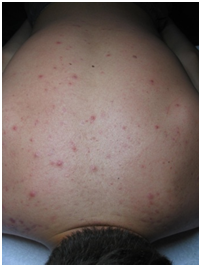Been to the skin care aisle lately looking for an acne cleanser? Then you've seen the overwhelming choices. But don't worry. With a little know-how, you can choose the right acne cleanser for you.
As a general rule, non-foaming cleansers or cleansing lotions tend to be less drying than foaming cleansers. These may be a good choice if your skin is already on the dry side because of acne treatments.
Many people swear you should never use bar cleansers on the face, but it's really OK if you use the right bar. Dove and Neutrogena are two bar examples that are perfectly gentle options for the face.
If you're currently using an acne treatment medication, like Retin-A or Accutane, a medicated cleanser might leave your skin too dry and uncomfortable. Ask your doctor if it's OK to use, or use a less drying, nonmedicated product instead.
If a cleanser is meant for the body, it should only be used on the body. Stronger doesn't mean better, especially when it comes to your skin. Always use a cleanser that is specifically designed for the face, to reduce the chance of irritation.
A better guide is to go with how the cleanser makes your skin feel. Tight, dry, itchy? Not the right cleanser for you. Try another brand.
Another option is an esthetician. Your esthetician can suggest cleansers, and usually will have them on sale for you to take home.
1-Choose a form of cleanser you like best.
Foaming or non-foaming? Bar or liquid? This really comes down to personal preference. All types of cleansers work equally well, so choose one you're familiar with.As a general rule, non-foaming cleansers or cleansing lotions tend to be less drying than foaming cleansers. These may be a good choice if your skin is already on the dry side because of acne treatments.
Many people swear you should never use bar cleansers on the face, but it's really OK if you use the right bar. Dove and Neutrogena are two bar examples that are perfectly gentle options for the face.
2-Decide if you need medicated or non-medicated.
Medicated acne cleansers are available both over-the-counter and with a prescription, and usually contain benzoyl peroxide, salicylic acid, or sulfur. Regular use can help reduce pore blockages and breakouts, although they tend to be drying. If you aren't using any other treatment product, a medicated cleanser may be a good choice.If you're currently using an acne treatment medication, like Retin-A or Accutane, a medicated cleanser might leave your skin too dry and uncomfortable. Ask your doctor if it's OK to use, or use a less drying, nonmedicated product instead.
3-Make sure the cleanser is meant for your face, and not your body.
The skin on your face, neck and décolleté (chest area) is quite thin and delicate. So while that super smelling, ultra cleansing body wash is great for elsewhere on the body, it isn't a good choice for your face.If a cleanser is meant for the body, it should only be used on the body. Stronger doesn't mean better, especially when it comes to your skin. Always use a cleanser that is specifically designed for the face, to reduce the chance of irritation.
4-Focus on how it makes your skin feel, not on the price.
High priced facial cleansers don't work any better than bargain products you can find at your local drug or discount store. So don't worry if you can't afford a pricey product (or just don't want to spend an arm and a leg!) You aren't doing your skin a disservice by choosing a great buy over trendy packaging.A better guide is to go with how the cleanser makes your skin feel. Tight, dry, itchy? Not the right cleanser for you. Try another brand.
5-Ask for a recommendation.
If you're seeing a dermatologist, ask him/her first. Not only will your doc have effective cleansers in mind, but knows exactly which acne medications you're using. You'll get personalized recommendations.Another option is an esthetician. Your esthetician can suggest cleansers, and usually will have them on sale for you to take home.




















